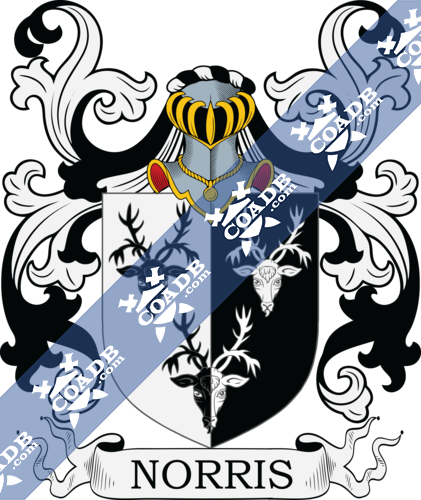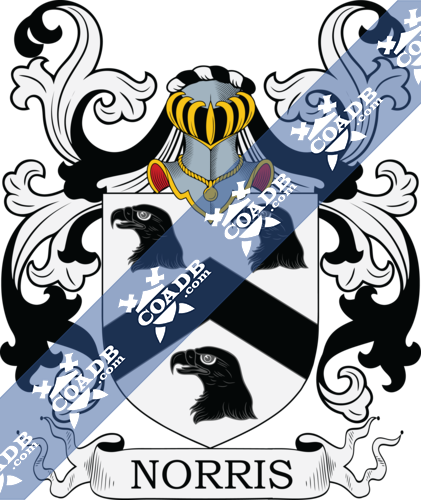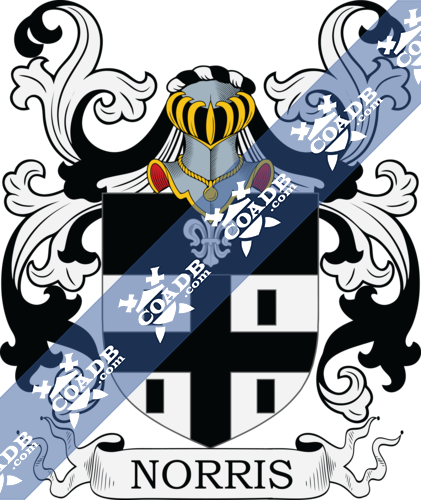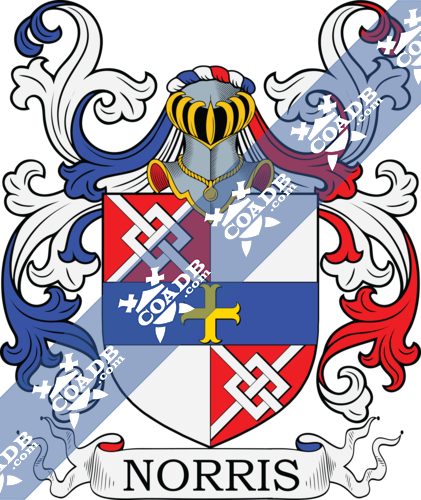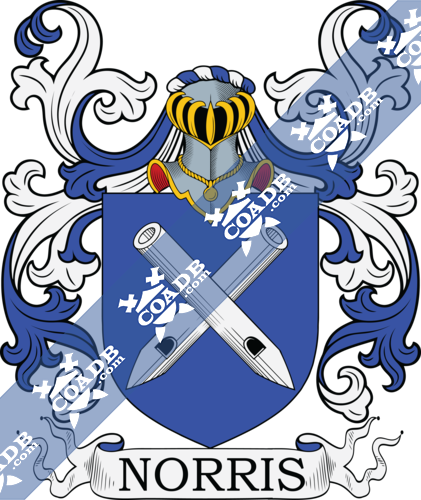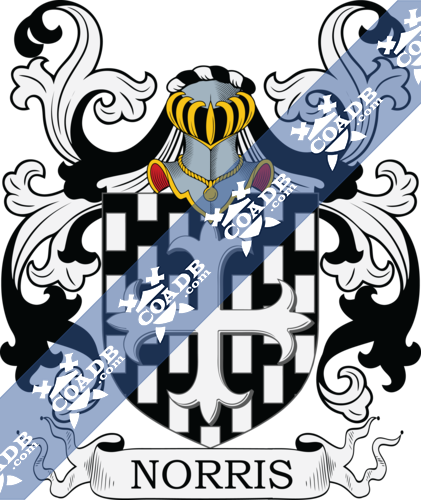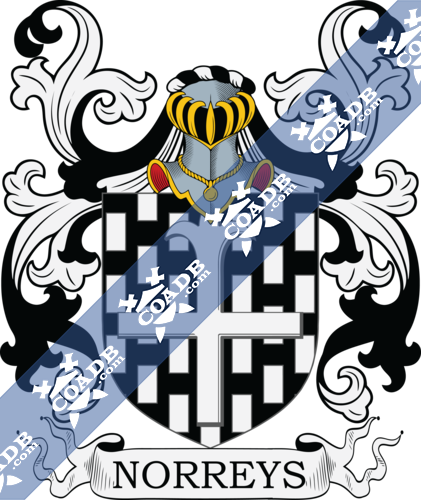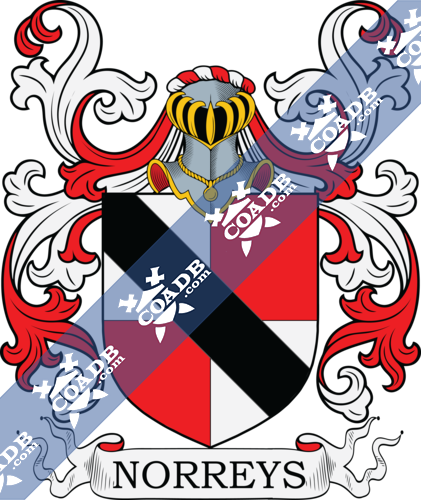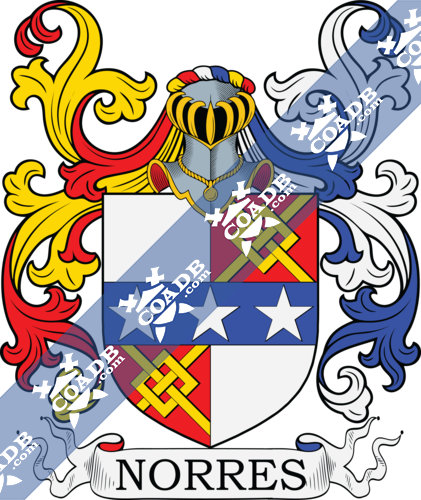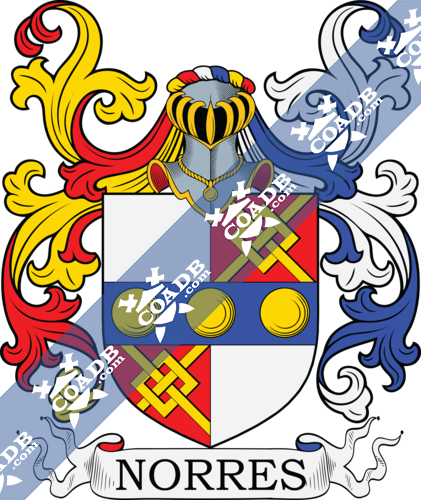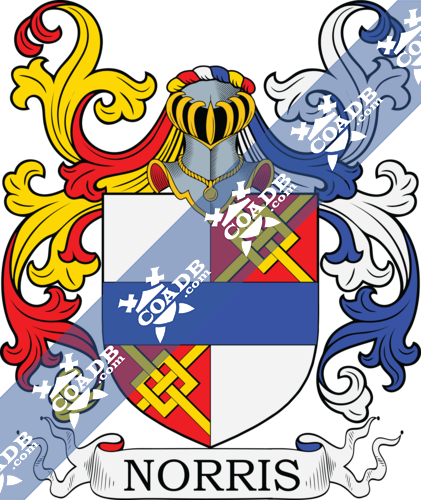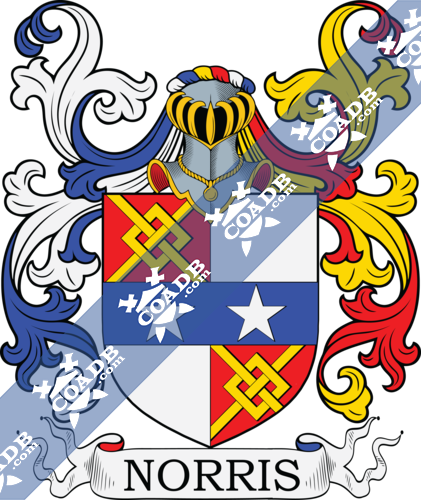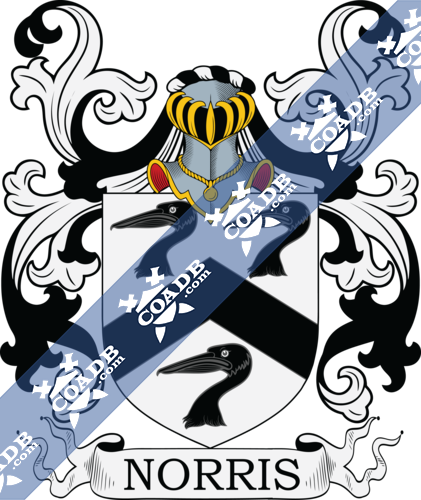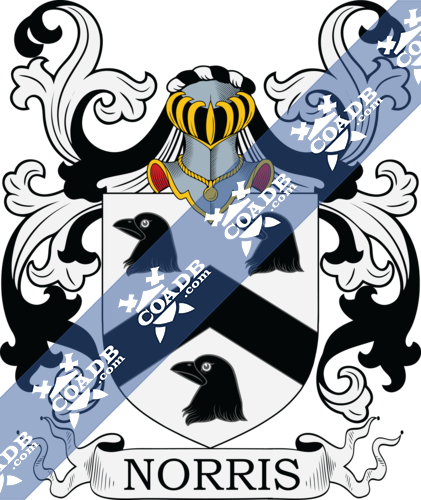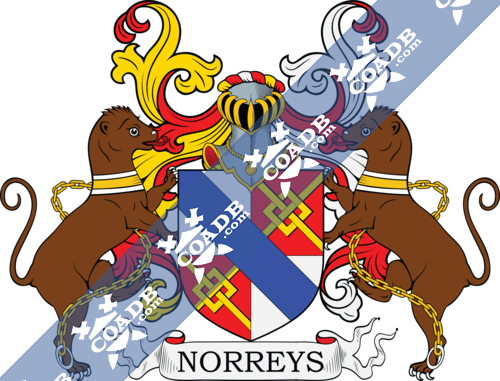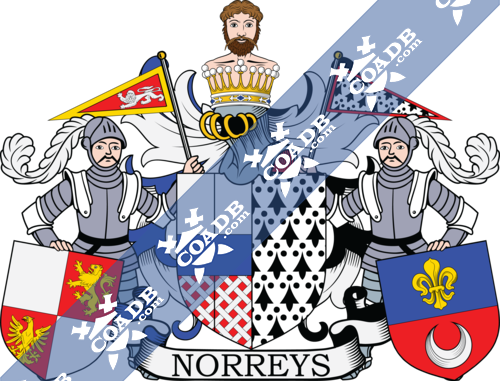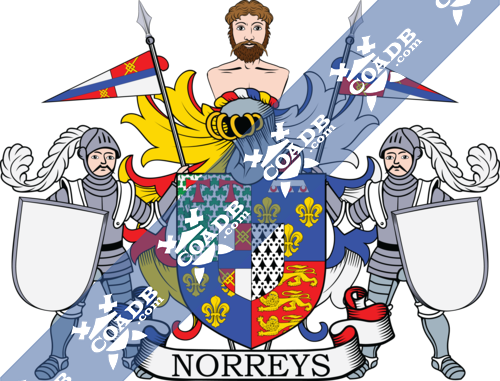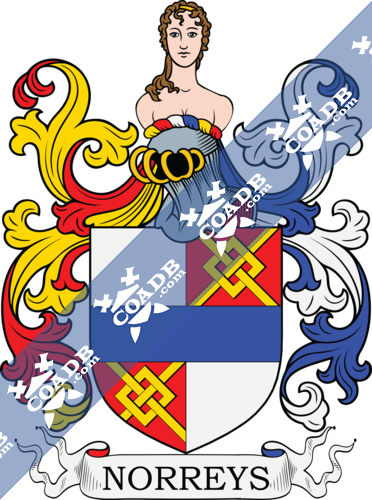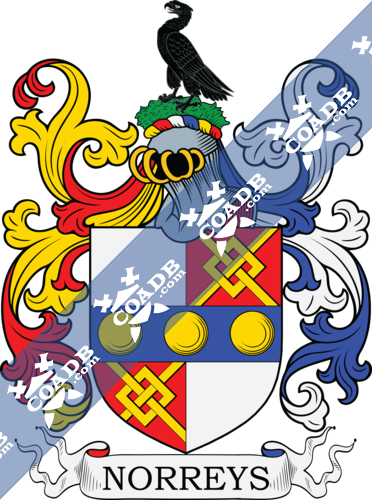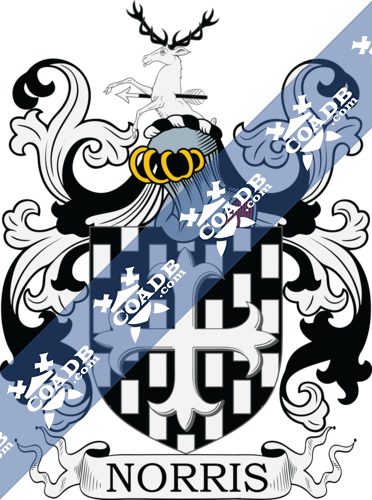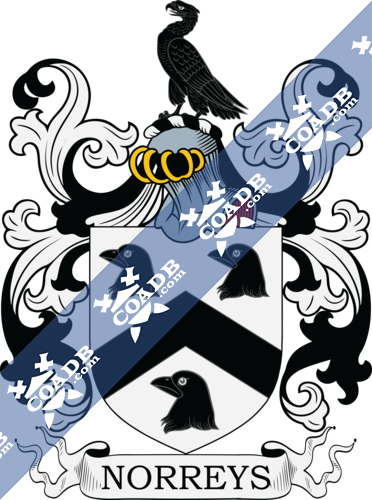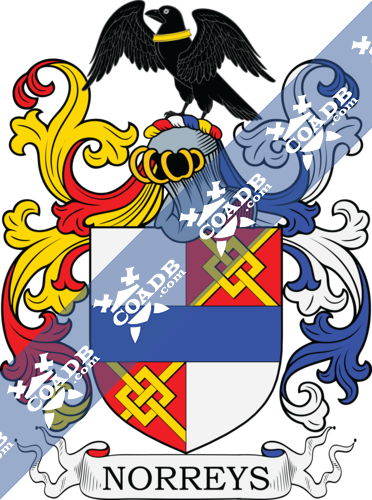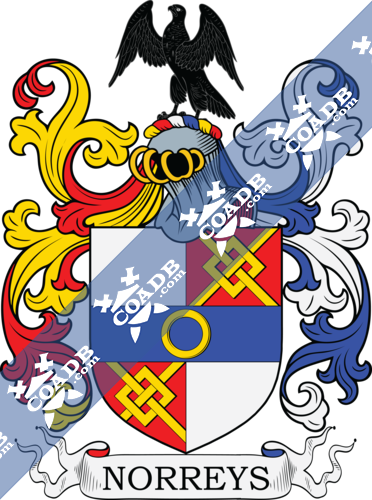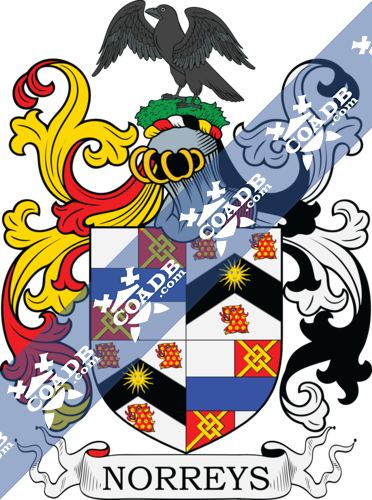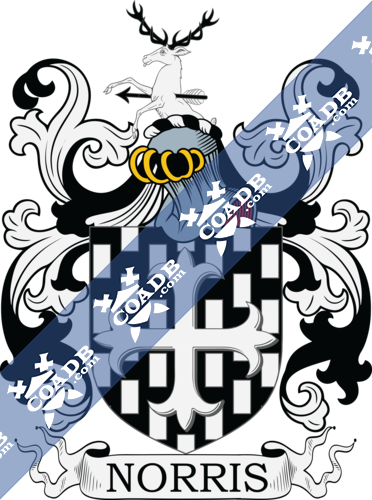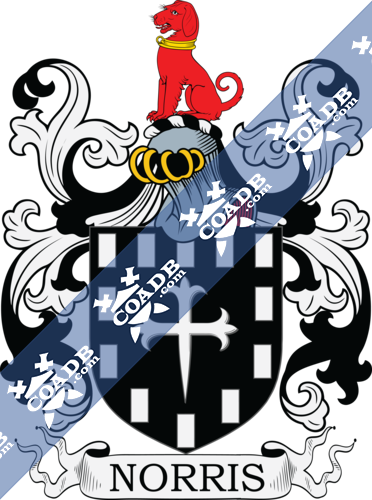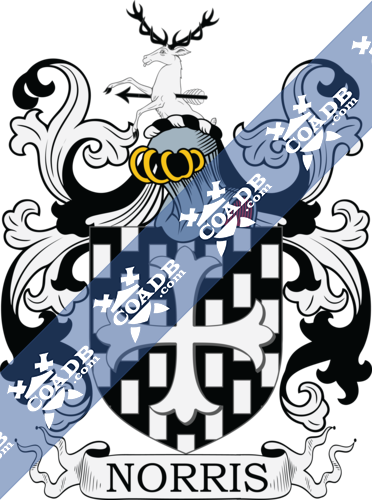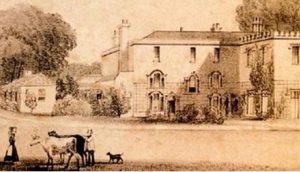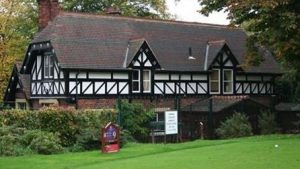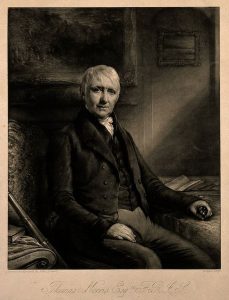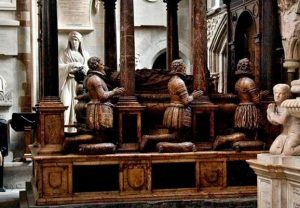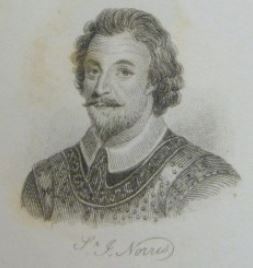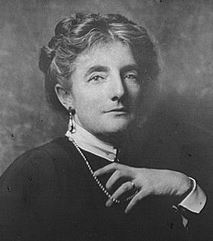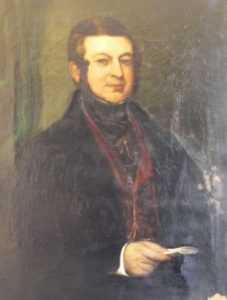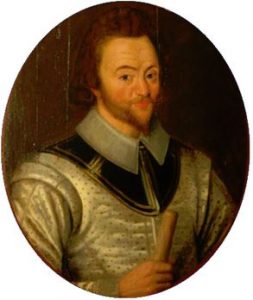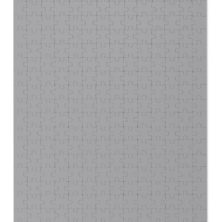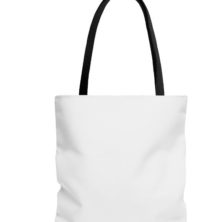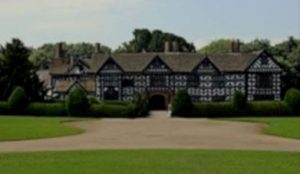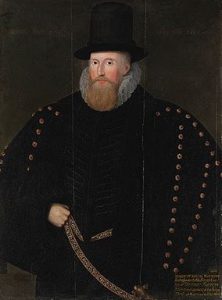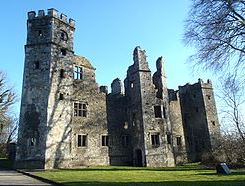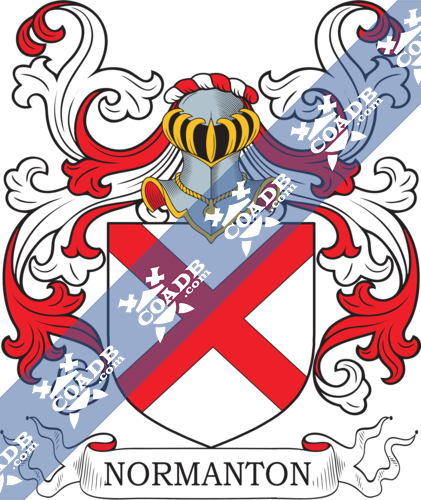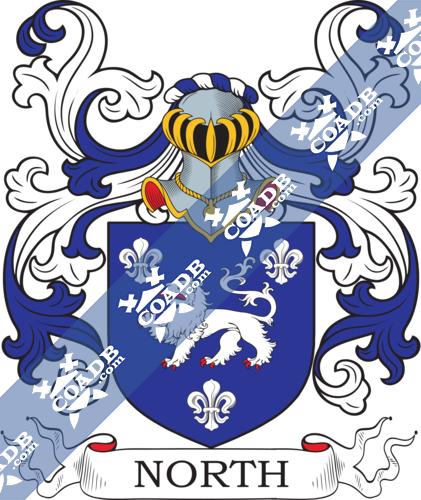Norris Family Crest, Coat of Arms and Name History
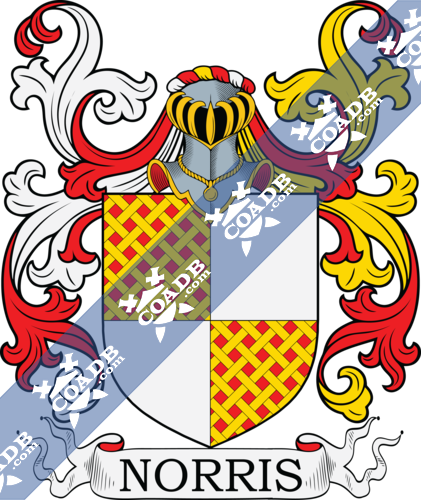
Norris Coat of Arms Gallery
Don’t know which Coat of Arms is yours?
We can do a genealogical research. Find out the exact history of your family!
Learn MoreSurname Name Meaning, Origin, and Etymology
There are three possible origin/meanings to the Anglo-French-Teutonic surname Norris, which was anciently spelled Le Noreis: 1) is a locational name meaning “the Noreis”, meaning the northern, or the man from the North, sometimes referring to a Norwegian (who raided the Scottish and English coast as Vikings many years prior to the Norman Conquest) or 2) it is an official naming meaning “the nurse”, from the Middle English word norice (and even earlier from the Latin word nutrix), or 3) a topographic name for someone who lived on the north side of an estate, which comes from the ancient words nor (north) and hus (house). Another source states it comes from the old word norroy, which literally means north king, and was a title given in England to the third king-at-arms, which is a senior rank of an officer of arms (an appointed person who controls armorial matters and deals with heraldry and genealogy). In French, the word Norrie means foster child. Most commonly, the surname was given to people who migrated to England or Scotland from the North (Scandinavia), deriving from the old French word norries, meaning “northerner”.
In his book, Homes of Family Names, H.B. Guppy writes: “Norris is a name that has now its principal homes in Lancashire and Somerset. In the 13th century it was frequent in the forms of Noreys, Norreys, Norries,and Norrays, often preceded by “Le,” in Notts, Oxfordshire, Norfolk, Yorkshire, Cambridgeshire, Hunts, Bucks, etc.”
Spelling Variations
Other spellings include Norrish, Norriss, Noreis, Norry, Norys, Norrys, Noris, and Norres.
Early Bearers of the Surname
As a personal name, there was a Norice recorded in the Roll of the Battell Abbey. As a surname, one of the earliest documented people bearing this name was Robert Norreis, who was recorded in the Winton Rolls of County Hampshire in 1148 AD. Another early bearer was Adam de Norhuse of Essex in 1206 AD. The Hundred Rolls of 1273 AD, a census of Wales and England, known in Latin as Rotuli Hundredorum, documents Thomas le Noreis. A one Robert le Norys is recorded in the Calendarium Inquisitionum Post Mortem (1216-1327 AD). A one Walter le Noreis is recorded in the Writs of Parliament in 1313 AD. A one Richard Norris was the mayor of Barnstaple in 1442 AD. Edward Norries, from county Lancashire, was recorded in 1579 AD in the Register of University of Oxford. Early marriages including this surname include John Norriss to Mary McClary at St. George’s Hanover Square in 1766.
History, Genealogy, and Ancestry
The famous genealogist Bernard Burke’s book “The Landed Gentry” discusses this surname in considerable detail. He begins the lineage with mentioning that the family originally settled in county Glamorgan during the start of the sixteenth century. The first person mentioned is John Norris, on Wincle in Devon, who marries Agnes Galhampton and had a son with her, named John. John lived in Splate, in the parish of St. Decumans in county Somerset, and he married Petronell Paslew and had a son with her named Hugh Norris. Hugh was born in 1540 and he was granted an arms and crest by Cooke, Clarenceux in 1573 AD. He married Joan Clarkey of Okey and with her had a son named John Norris. John married Joan News in 1609 AD and has a son with her named Hugh Norris, born in 1611. Hugh purchased an estate in Hackney, in county Middlesex, from Thomas Lord Wentworth in 153. He married Susan Polsted and with her has a son named Hugh. This Hugh married Esther Watson, and with her had a son named Henry Norris. Henry was born 1677 and died in 1762. He married Elizabeth Brookes and had six children with her: Hugh (1705), Henry (1707), Benjamin (1709), William (1712), Mary (1711), and Elizabeth. He was succeeded by his son Henry who married Elizabeth, daughter and co-heir of Gervais Handley, and had issue with her: Henry Handley, Peter, and Elizabeth. His successor was Henry Handley Norris, born in 1734, who in 1768, married Grace Warton and had the following children with her: Henry Handley (died young), Henry Handley, Elizabeth, and Anne Henrietta. His second son became his heir, and became known as Reverend Henry Handley Norris. He was born in 1771 and was Rector of South Hackney. In 1805, he married Henrietta Catherine, the daughter of David Powel, and with her has a son named Henry who succeeded him. Henry, of Swalcliffe Park was born in 1810 and he married Ellen Crawley in 1833 and had issue with her: Henry Crawley, George Hugh, Ellen Henrietta, Anne Henrietta, Mary Elizabeth, and Alibinai Georgiana.
Burke also discusses Norreys of Davyhulme Hall. He begins the discussion with Robert Henry Norreys of county Lancaster, who was born in 1812 and succeeded the family estates when his mom passed away in July of 1868. Burke states the lineage began when the family sustained an honorable position in county Palatine of Lancaster for many centuries. William Norreys, of Sutton, was descended from Alain Norrey, who lived in the area hundreds of years prior. William married Joan, the daughter of Sir John Molyneux, of Sefton, and through her acquired the estate of Speke. From him arose the greates Houses of Norreys of Speke and Norreys of Rycote. Nichcolas Norreys of Tarleton, the third son of Thomas Norreys who living during the reign of King Henry VI of England, married a woman named Lettice and with her had Nicholas Norreys. Nicholas in turn has a son named Nicholas, and Nicholas had a son also named Nicholas. This third Nicholas married Constance Parkinson and with her had a son named Nicholas Norreys, of Middleforth, born in 1633. This fourth Nicholas married Dorothy Farringdon and was succeeded by his son Henry Norris, of Middleforth-cum-Penawortham. Henry married Elizabeth Loxham, and was succeeded by his son, also named Henry who was baptized in 1694. Henry married Mary Blackledge and with her had a son named Henry. This Henry married Catharine Shawe in 1739, and with her has a successor also named Henry (born in 1744). This Henry married Mary, the daughter of John Allen of Mayfield. They had a daughter, an heiress named Mary Norreys, of Davyhulme Hall, who was born in 1780 and married, in 1809, Robert Josias Jackson Harris. Together they had several children: Robert Henry (previously mentioned), Caroline (who married John Smith Enwisle), and Isabella (who married Reverend George Hall Bowers).
This name as le Norreys became very common in Irish records since the 1200s AD. It came into special importance with the arrival of Sir John Norris, who was responsible for the t massacre at Rathlin Island in 1575 AD. He became President of Munster in 1584, and was later succeeded by his brother Thomas in 1597 AD.
Early American and New World Settlers
The book “Genealogical Guide to Early American Settlers” mentions two people with this last name: 1) Edward Norris of Salem MI, who was an ordained minister at a church there, and he joined a Boston church in 1639, who married Elinor and had a daughter named Mary and 2) Nicholas Norris of Exeter, recorded in 1666 who took an oath of allegiance and in 1690 desired jurisdiction in Massachusetts. Other early American settlers include: Mary Norris (1620), Edward Norris (1630), Ann Norris (Maryland 1637), Elizabeth Norris (1638), and Humphrey Norris (Philadelphia 1717). Joseph Norris emigrated to the Somer Islands (Bermuda) aboard the Truelove in 1635.
Thomas Norris was born in 1608 in Conghan, England, the son of Geoffrey (Norris) Noreys and Mary Anne (Myles) Norris. He married Ann Hynson in 1637 and has numerous issue: Thomas Norris Jr., Geoffrey Edward, Ann, Daniel, Alice, Cuthbert, Robert, John, and John. He died in 1675 in Maryland. His son John Norris was born in 1652 in St. Mary’s Maryland. He married Susannah Heard in 1679 and with her had a son name Luke, born in 1689. Luke married Catherine Jean Heard and had two children: John and Joseph. His son John was born in 1722, and with his wife Jane Stevenson, had a son named Nathan, born in 1769. Nathan Norris married Martha Patterson and had a child named James, born in 1798. James married Elizabeth Carter and Mary Newell, and left one son: Newton Norris, who was born in 1838. Newton married Mary Elizabeth Martin and with her had a son named Walter Norris. Walter (1877-1966) married Sarah Hornibrook and had a daughter with her named Ruth.
Mottoes
The family mottoes include 1) fideliter serva, meaning “perform faithfully”, 2) Loyalment je sers, meaning “I serve loyally”, 3) Steady.
Grantees
Some of the later grantees of arms with this surname include: 1) Norris, Samuel, and coz. John, Chapter Clerk of Canterbury, [1748], and 2) Norris, late Harris, Robt. J. J., of Davey Hulme, co. Lane, [1808]
Notables
Famous people with this last name include: 1) Francis Lushington Norris (1864-1945) who was an Anglican missionary bishop in China, 2) Kathleen Thompson Norris (1880-1966) an American novelist and columnist, 3) Chester Edward Norris Jr. (1927-2016) was a U.S. Ambassador to Equatorial Guinea, and 4) Carlos Ray “Chuck Norris” (born 1940) who is a famous American actor known for his martial arts.
Blazons & Genealogy Notes
1) (Norris, co. Devon; the heiress m. Fortescue). Quarterly, gu and ar., the 1st and 4th quarters fretty or.
2) or Norreys – (Penlyne, co. Glamorgan; Harl. MSS. 1366). Sa. billettée ar. a cross flory of the last. Crest—A demi stag ar. attired sa. pierced through the body with an arrow of ths last, headed and feathered of the first.
3) (Wychingham, co. Norfolk, 1766). Quarterly, ar, and gu., in the 2nd and 3rd a fret or, over all a fess az.
4) (arms in Raynesford Manor House, co. Oxford. Visit. Oxon, 1566). Quarterly, gu. and ar. in the 1st and 4th quarters a fret of the second, over all on a fess az. two mullets alao of the second.
5) (co. Hants). Ar. a chev. betw. three pelicans’ heads erased sa.
6) (Swalcliffe Park, co. Norfolk). Sa. billettée ar. a cross flory of the last. Crest—A demi stag ar. attired sa. pierced through the body with an arrow of the last, feathered of the first.
7) (Guist and Woodnorton, co. Norfolk). Sa. a cross flory fitchée betw. twelve billets ar. Crest—A talbot sejant gu. collared and ringed or.
8) Sa. billettée ar. a cross patonce of the last. Crest—A demi buck ar. attired and unguled sa. vulned in the shoulder with an arrow of the last, feathered of the first.
9) or Norreys – (John Norreys, second son of Sir William Norreys, of Speke, who m. the dau. and heir of Ravenscroft, of Cotton, and assumed the arms of that family). Ar. a chev. betw. three ravens’ heads erased sa.
10) Per pale ar. and sa. three reindeers’ heads cabossed and counterchanged.
11) (alias Banks, alias Bank). Ar. a chev. betw. three falcons’ heads erased sa.
12) (Fun. Ent. Ulster’s Office, 1642 ; Lettice, wife of Tobias Norris, merchant, Dublin). Ar. a cross betw. Four billets sa. on a chief of the second a fleur-de-lis of the first.
13) (Fun. Ent. Ulster’s Office, 1662, Richard Norris, Esq.). Quarterly, gu. and ar. on a fess az. a cross moline or, in the 1st and 4th quarter a fret of the second.
14) or Nores – (Reg. Ulster’s Office). Az. two organ pipes in saltire ar. the dexter surmounted of the sinister.
15) (Splate, co. Somerset; John Norris, temp. James I., son of Hugh Norris, of same place. Visit. Somerset, 1623. Granted by Cooke, Clarenceux, 1573). Sa. billettee ar. a cross flory of the last.
16) (Speke, co. Lancaster; an ancient family in that co., descended from William Norreys, Esq., of Sutton, who m. Joan, heiress of Speke, dau. of Sir John Molyneux, Knt., of Sefton. The eventual heiress, Mary, only child of Thomas Norreys, Esq., of Speke, M.P. for Liverpool, m. Lord Sydney Beauclerk. The families of Norreys of Bray, Lords Norreys of Rycote, Norreys of Fifield, and Norreys of Davyhulme, all descended from younger sons of the house of Speke. Of the house of Speke were the Norreys of Bray, co. Berks, who eventually became Barons Norreys). Quarterly, ar. and gu., in the 2nd and 3rd quarters a fret or, over all a fesse az. The original crest of the family appears, by a copy from a window in Childwall Church, co. Lancaster (Harl. MSS. 1997), to have been a woman’s head couped at the breasts, but on the marriage of Sir Henry Norreys, temp. Henry V., with the dau. and heir of Roger Erneis, of Chester, the Erneis’ bearing was taken for a crest, viz., An eagle sa. rising from a mount vert.
17) (Earl of Berkshire and Baron Norreys, of Rycote, earldom extinct 1623; barony vested in the Earl of Abingdon). (bart. extinct; Sir William Norreys, M.P. for Liverpool, brother of Thomas Norreys, Esq., of Speke, was created a bart. 1698, and d. s. p.). Quarterly, ar. and gu. in the 2nd and 3rd quarters a fret or, over all a bend az. Supporters—Two monkeys collared and chained ppr.
18) (Davyhulme Hall, co. Lancaster; a branch of Norreys, of Speke; Henry Norris, Esq., of Davyhulme Hall, left an only dau. and heiress, Mart Norris, of Davyhulme, m. 1809, Robert Josias Jackson Harris, Esq., who assumed the name and arms of Norris). Quarterly, ar. and gu. in the 2nd and 3rd quarters a fret or, over all on a fess az. three bezants. Crest—On a mount vert an eagle, sa.
19) (co. Gloucester). Sa. semée of billets ar. a cross flory at the top only of the second.
20) (Cockwells, co. Berks). Ar. a chev. sa. betw. three ravens’ heads erased of the last. Crest—An eagle (or raven) sa. Motto—Feythfully serve.
21) (Weston-on-the-Green, co. Oxford; Sir Francis Norreys, Knt., of Weston. Visit. Oxon 1634, d. July, 1669). Quarterly, ar. and gu., in the 2nd and 3rd quarters a fret or, a fess az. Crest—A raven’s wings elevated ea. collared or.
22) (quartered by Reginald, Cardinal Pole, in a coat in Magdalen College, Oxford. Visit. Oxon, 1566). Quarterly, ar. and gu., a bend sa.
23) (Sir Thomas Norreys, knighted at Christ Church Cathedral, Dublin, by Sir William FitzWilliam, Lord-Deputy, 1588; he was afterwards, 1597, Lord-Deputy of Ireland) Quarterly, ar. and gu., a fess az., in the 2nd and 3rd quarters a fret or, an annulet for diff. Crest—A falcon rising sa.
24) (Jephson-Norreys, Mallow, co. Cork, bart.). Quarterly, 1st and 4th, quarterly, ar. and gu., in the 2nd and 3rd quarters a fret or, over all a fesse az., for Norreys; 2nd and 3rd, ar. on a chev. sa. a sun in glory or, betw. three lions’ heads bezantée gu., for Jephson. Crest—On a mount vert a raven rising ppr. Motto—Loyalement je sers.
25) de Halton – Normandie – Prince de Longjumeau – Parti au 1 écartelé a) et b) d’argent plain c) et d) de gueules fretté d’argent à la fasce d’azur brochant sur l’écartelé (Norreys) au 2 d’hermine (qui est de Bretagne) Timbre couronne de prince français alternée de fleurs-de-lys et un casque surmonté d’une couronne de comte Cimier un buste de femme au naturel posé de face Tenants deux chevaliers armés de toutes pièces celui de dextre tenant de sa senestre un pennon de gueules au lion d’argent à la bordure d’or sa dextre appuyée sur un écu écartelé aux 1 et 4 d’argent au 2 de gueules au lion d’or au 3 de gueules à l’aigle d’or celui de senestre tenant de la main dextre un pennon d’hermine bordé de gueules sa senestre appuyé sur un écu coupé au 1 d’azur à la fleur-de-lys d’or au 2 de gueules au croissant d’argent Devise LOYALEMENT JE SERS. English: Per pale: 1st quarterly: a) and b) argent plain; c) and d) gules fretty argent; a fess azure covering over the quarterly (Norreys); 2nd ermine ( which is of Brittany); around the shield a crown of the french prince alternatively a fleur-de-lys or a helmet surmounted by a crown of a count; Crest: a bust of a man proper placed facing forwards; Supporters: two knights armed fully, that to the dexter holding in his sinister hand a small triangular flag gules witha a lion argent and a bordure or, his dexter resting on a shield – quarterly: 1st and 4th argent, 2nd gules a lion or; 3rd gules with an eagle or; the sinister knight holding in the dexter hand a small triangular flag ermine fimbriated gules, his sinister resting on a shield – per fess 1st azure with fleur-de-lys or; 2nd gules a crescent argent; Motto: LOYALEMENT JE SERS.
26) de Longjumeau – France – Écartelé au 1 d’argent semé de trèfles de sinople à deux taus de gueules en chef et deux perroquets de sinople essorants et affrontés en pointe (Gaillard) au 2 d’azur à trois fleurs-de-lis d’or 2 et 1 au lambel de trois pendants d’argent chaque pendant chargé d’un croissant de gueules (Valois-Orléans) au 3 d’azur à trois fleurs-de-lis d’or au 4 de gueules à trois léopards d’or l’un sur l’autre Sur le tout parti A) écartelé d’argent plain et de gueules à une frette d’or à la fasce d’azur brochant sur la ligne du coupé B) d’hermine plain (Norreys de Halton) Cimier un buste de femme issant de face Tenants deux hommes d’armes tenant un bouclier et une lance ornée d’un pennon aux armes du A) du sur le tout Devise LOYALEMENT JE SERS English: Quarterly: 1st argent semee of trefoils vert, two tau crosses gules in chief and two parrots vert soaring and affrontant [face to face] in base ( Gaillard ); 2nd azure three fleur-de-lys or, 2 and 1, a label of three points argent, each point charged with a crescent gules (Valois-Orléans); 3rd azure three fleur-de-lys or; 4th gules three lions passant guardant or in pale; an escutcheon per pale: A) quarterly – argent plain and gules with a fret or, a fess azure covering over the fesswise partition line; B) ermine (Norreys de Halton); Crest: a bust of a man issuant, facing forward; Supporters: two men armored, each holding a shield and a lance, decorated with a small triangular flag with the arms from segment A of the escutcheon; Motto: LOYALEMENT JE SERS.
27) (Tarlton, co. Lancaster, 1664). (West Derby, co. Lancaster, 1664). Quarterly, ar. and gu., in 2nd and 3rd quarters a fret or, on a fess az. three mullets of the third.
28) (Middleforth, co. Lancaster, 1664). Same Arms, the fess charged with three bezants instead of mullets.

